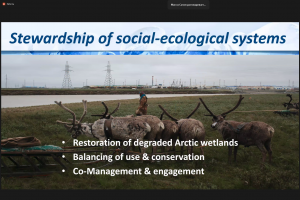PetrSU representatives participated in an international webinar devoted to the significance of wetlands to the lives ofindigenous people of the Arctic
PetrSU representatives participated in an international webinar devoted to the significance of wetlands to the lives ofindigenous people of the Arctic.
PetrSU representatives participated in an international webinar devoted to the significance of wetlands to the lives ofindigenous people of the Arctic.
PetrSU2-year Master’s degree students in “Biology” and “Ecology and Environmental Management” joined the webinar in the framework of the disciplines “International cooperation in environmental protection” (teacher – LuidmilaSergienko, Professor) and “Bog Studies” (teacher – Tamara Diachkova, Associate Professor).
Marcus Carson, Ph.D., Senior Research Fellow and Associate Professor of Sociology at Stockholm Environment Institute, moderated the webinar.
The webinar featured 3 topics:
Arctic wetlands restoration (reporter TatianaMinaeva, Candidate of Biological Sciences, Senior Researcher at the Centre for the Conservation and Restoration of Wetland EcosystemsIFS RAS).
Land use and management (reporters: HlynurÓskarsson, Landscape Ecologist at the Agricultural University of Iceland; Federica Skarpa, Communications Manager at Icelandic Arctic Cooperation Network (IACN); Anna-Maria Person, Representative of the Saami Council).
Co-managing and participating in the Arctic wetlands restoration (reporters: Victoria Bushman, Master’s degree student, Research Fellow in conservation of the environment, University of Washington / Greenland Institute of Natural Resources).
Tom Barry, Executive Secretary of theConservation of Arctic Flora and Fauna (CAFF),the biodiversity working group of the Arctic Council, also participated in the webinar.
The reports emphasized that the Arctic wetlands are vast areas of peatlands, tundra lands and underlying permafrost that provide people with a range of benefits via supporting the biodiversity and keeping water and carbon.
“Unfortunately, they are also subject to damage and degradation as a result of anthropogenic impacts, including land use, exploration and resource exploitation, and also depend on climate change”,
– said the scientists.
Participants of the online meeting discussed three key questions: what measures can be taken to accelerate the restoration of wetlands in the Arctic? How can the issues of responsible land usebe resolved as efficiently as possibleto prevent future damage and degradation? What steps can be taken to manage the Arctic wetlands jointly with indigenous people?
“This form of participation in the international webinar devoted to the relevant theme on the Arctic nature preservation gave students a singular opportunity to discuss interesting issues through informal dialogue with specialists and other stakeholders, as well as to improve their professional and personal competencies in attempts to unleash the young people potential in the field of protection of the wetlands”,
– said the organizers.
“We are grateful for the invitation to participate in the webinar, for the simultaneous interpretation of the reports into Russian, and we look forward to further cooperation”,
– the webinar participants thanked the organizers and speakers.

